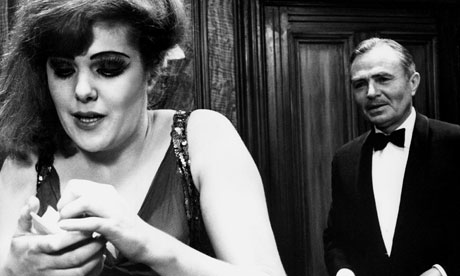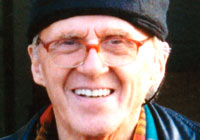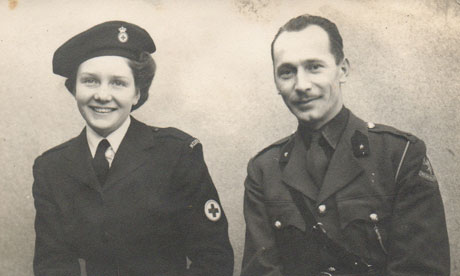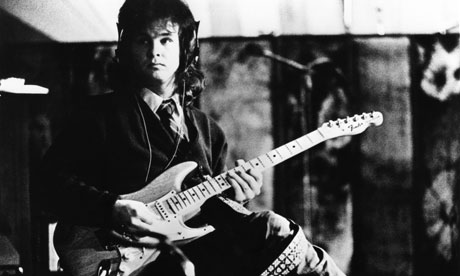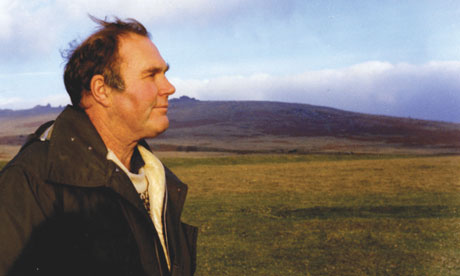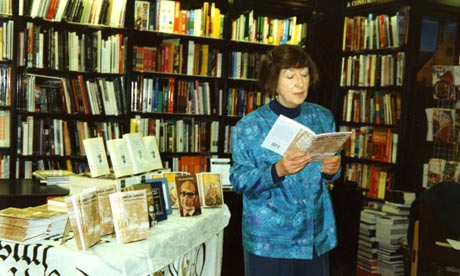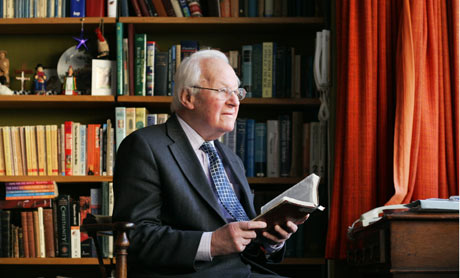
John Stott in 2006. He has been described as 'a renaissance man with a reformation theology'.
Though the name of the Rev John Stott, who has died at the age of 90, rarely appeared in the UK national press, in April 2005 Time Magazine placed him among the world's top 100 major influencers. A comment piece in the New York Times six months earlier had expressed surprise that he was ignored by the press, since he was a more authentic advocate for evangelical Christianity than more colourful figures such as Jerry Falwell.
Stott, radical in his conservatism, could not be pigeonholed. He was deeply committed to the need for social, economic and political justice and passionately concerned about climate change and ecological ethics. He regarded the Bible as his supreme authority and related its teaching to all areas of knowledge and experience. He insisted that Christians should engage in "double listening" – to the word of God, and to the world around them – and apply their biblical faith to all the pressing issues of contemporary culture. He himself researched, preached and wrote on a wide range of matters – from global debt to global warming, from the duties of the state to medical ethics and euthanasia. This was the kind of evangelicalism he embodied.
Stott was born in London, the fourth child and only son of Sir Arnold Stott and his wife, Lily. His father, a Harley Street physician, hoped he would enter the diplomatic service, and his peace-seeking spirit could have equipped him well for this. But at the age of 17, while at Rugby school, Warwickshire, his plans took a different turn. One February afternoon, he came to view the Christian gospel as compelling, and shortly afterwards resolved to be ordained into the church.
From school, having been excused national service as a conscientious objector – though he later came to accept the validity of the idea of a just war – Stott went to Trinity College, Cambridge, where he gained a double first in French and German. He then trained for ordination at Ridley Hall, Cambridge. In 1945 he became a curate at All Souls, Langham Place, in central London. This was the church where, as a child, he had terrorised the girls in Sunday school with his toy guns and daggers.
Stott has been described as "a renaissance man with a reformation theology". He had a sharp inter-disciplinary mind, and always worked to bring his thinking under the scrutiny of the Bible. It was, he believed, possible to understand the world only in the light of the Bible's teaching about God and humankind.
While the US evangelist Billy Graham, a long-time friend, was drawing tens of thousands to sports stadiums, Stott's mission field was the university campus. He conducted week-long events at universities in many countries, presenting a case for a Christian worldview, and drawing even the most cynical students into the pages of the New Testament.
In 1950, while only 29, he became rector of All Souls, a crown appointment. When released by the Church of England for wider ministry in 1970, he moved into a mews flat above the rectory garage. This modest two-roomed home became his base until 2007. Much of his substantial writing – a total of 50 books translated into 65 languages – was completed in a remote cottage on the Welsh coast which he bought in 1954. It was at that stage derelict, and for many years had no mains electricity. Stott's books included the million-selling Basic Christianity (1958), Christ the Controversialist (1970) and The Cross of Christ (1986). His final book, A Radical Disciple, "to say goodbye to his readers", was published last year.
Stott was behind the shaping of The Lausanne Covenant (1974), a significant statement of international co-operation in the cause of world evangilisation. He founded several evangelical initiatives in Britain, including the London Institute for Contemporary Christianity (1982) of which the sociologist and broadcaster Elaine Storkey later became director, succeeded by Mark Greene. Through his work with the university Christian Unions in the UK and overseas, he engaged with many of the sharpest up-and-coming Christian thinkers while they were still students.
His influence in the church has spread to more than 100 countries through his founding of Langham Partnership International. In the US, it operates under the name of John Stott Ministries. This threefold initiative, now under the direction of the theologian and author the Rev Chris Wright, works to strengthen the church in the developing world by training preachers, funding doctoral scholarships for the most able theological thinkers, and providing basic, low-cost libraries for pastors. Stott's own considerable royalties from his writing went towards the production and distribution of theological books in developing countries.
Stott was appointed CBE in 2006. He had served as chaplain to the Queen (1959-91) and then as extra chaplain until he died. His six doctorates included one from Lambeth Palace.
From childhood, Stott was taught by his father to love the natural world. He became an expert self-taught ornithologist, sighting and photographing some 2,500 bird species.
Urbane and gracious as both visionary and strategist, Stott left the Langham Partnership as perhaps his major legacy. His influence will doubtless attract much further attention.
• John Robert Walmsley Stott, clergyman and theologian, born 27 April 1921; died 27 July 2011
Stott, radical in his conservatism, could not be pigeonholed. He was deeply committed to the need for social, economic and political justice and passionately concerned about climate change and ecological ethics. He regarded the Bible as his supreme authority and related its teaching to all areas of knowledge and experience. He insisted that Christians should engage in "double listening" – to the word of God, and to the world around them – and apply their biblical faith to all the pressing issues of contemporary culture. He himself researched, preached and wrote on a wide range of matters – from global debt to global warming, from the duties of the state to medical ethics and euthanasia. This was the kind of evangelicalism he embodied.
Stott was born in London, the fourth child and only son of Sir Arnold Stott and his wife, Lily. His father, a Harley Street physician, hoped he would enter the diplomatic service, and his peace-seeking spirit could have equipped him well for this. But at the age of 17, while at Rugby school, Warwickshire, his plans took a different turn. One February afternoon, he came to view the Christian gospel as compelling, and shortly afterwards resolved to be ordained into the church.
From school, having been excused national service as a conscientious objector – though he later came to accept the validity of the idea of a just war – Stott went to Trinity College, Cambridge, where he gained a double first in French and German. He then trained for ordination at Ridley Hall, Cambridge. In 1945 he became a curate at All Souls, Langham Place, in central London. This was the church where, as a child, he had terrorised the girls in Sunday school with his toy guns and daggers.
Stott has been described as "a renaissance man with a reformation theology". He had a sharp inter-disciplinary mind, and always worked to bring his thinking under the scrutiny of the Bible. It was, he believed, possible to understand the world only in the light of the Bible's teaching about God and humankind.
While the US evangelist Billy Graham, a long-time friend, was drawing tens of thousands to sports stadiums, Stott's mission field was the university campus. He conducted week-long events at universities in many countries, presenting a case for a Christian worldview, and drawing even the most cynical students into the pages of the New Testament.
In 1950, while only 29, he became rector of All Souls, a crown appointment. When released by the Church of England for wider ministry in 1970, he moved into a mews flat above the rectory garage. This modest two-roomed home became his base until 2007. Much of his substantial writing – a total of 50 books translated into 65 languages – was completed in a remote cottage on the Welsh coast which he bought in 1954. It was at that stage derelict, and for many years had no mains electricity. Stott's books included the million-selling Basic Christianity (1958), Christ the Controversialist (1970) and The Cross of Christ (1986). His final book, A Radical Disciple, "to say goodbye to his readers", was published last year.
Stott was behind the shaping of The Lausanne Covenant (1974), a significant statement of international co-operation in the cause of world evangilisation. He founded several evangelical initiatives in Britain, including the London Institute for Contemporary Christianity (1982) of which the sociologist and broadcaster Elaine Storkey later became director, succeeded by Mark Greene. Through his work with the university Christian Unions in the UK and overseas, he engaged with many of the sharpest up-and-coming Christian thinkers while they were still students.
His influence in the church has spread to more than 100 countries through his founding of Langham Partnership International. In the US, it operates under the name of John Stott Ministries. This threefold initiative, now under the direction of the theologian and author the Rev Chris Wright, works to strengthen the church in the developing world by training preachers, funding doctoral scholarships for the most able theological thinkers, and providing basic, low-cost libraries for pastors. Stott's own considerable royalties from his writing went towards the production and distribution of theological books in developing countries.
Stott was appointed CBE in 2006. He had served as chaplain to the Queen (1959-91) and then as extra chaplain until he died. His six doctorates included one from Lambeth Palace.
From childhood, Stott was taught by his father to love the natural world. He became an expert self-taught ornithologist, sighting and photographing some 2,500 bird species.
Urbane and gracious as both visionary and strategist, Stott left the Langham Partnership as perhaps his major legacy. His influence will doubtless attract much further attention.
• John Robert Walmsley Stott, clergyman and theologian, born 27 April 1921; died 27 July 2011
